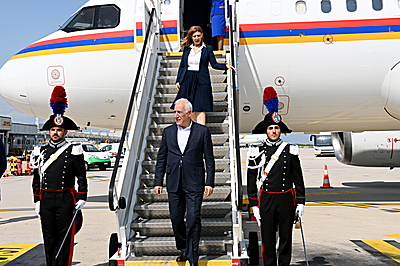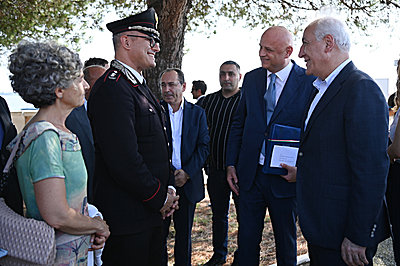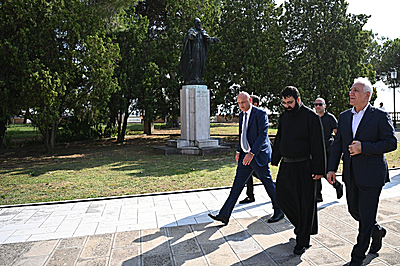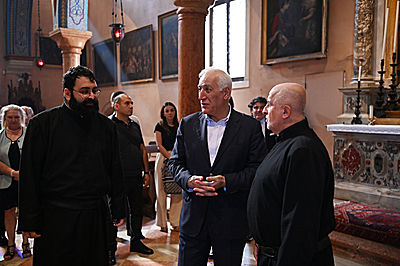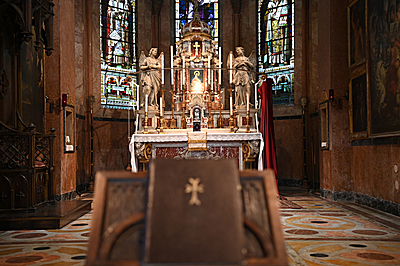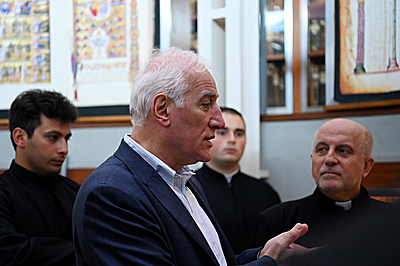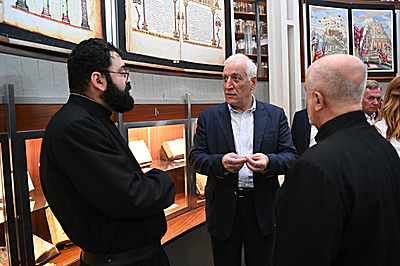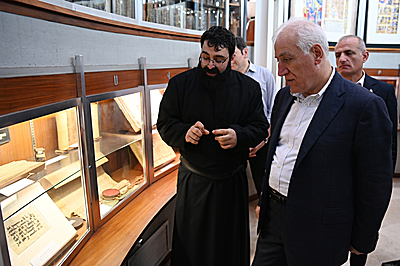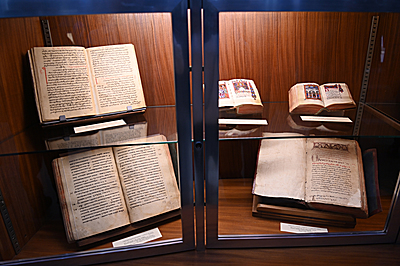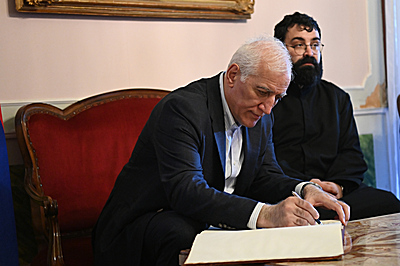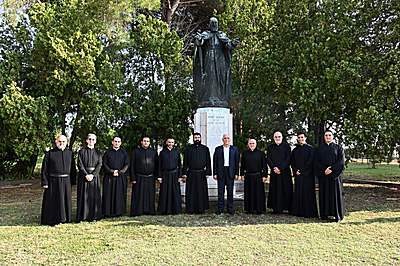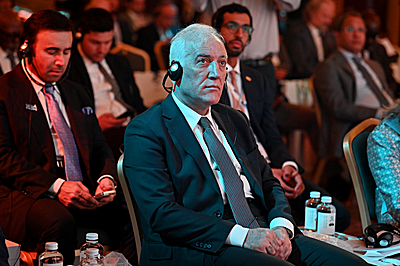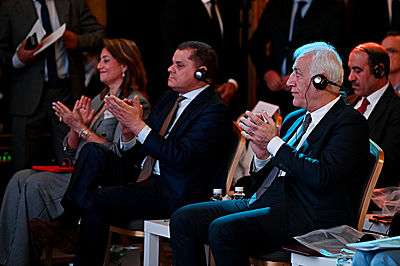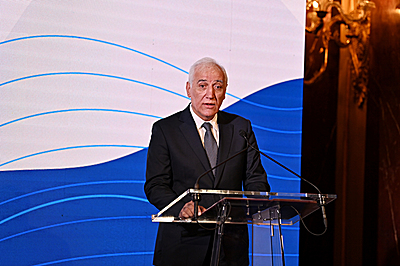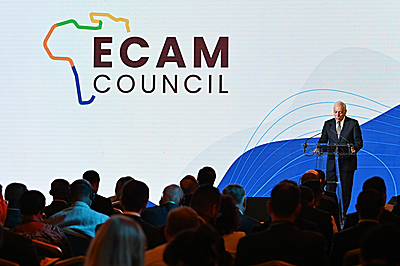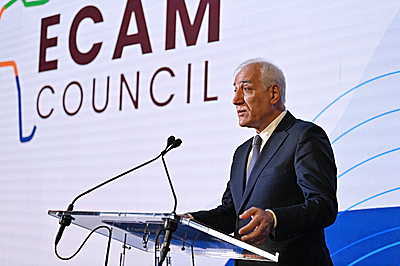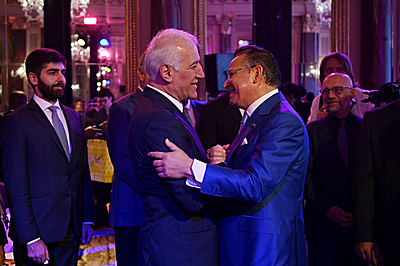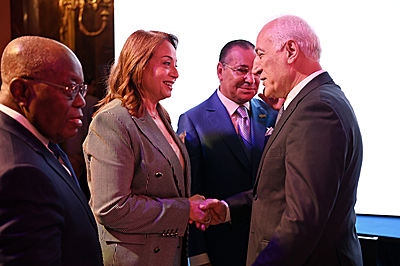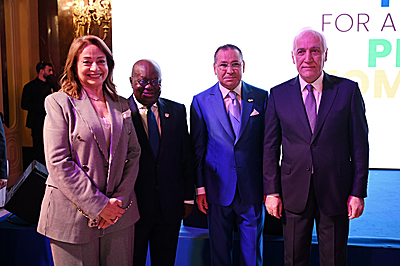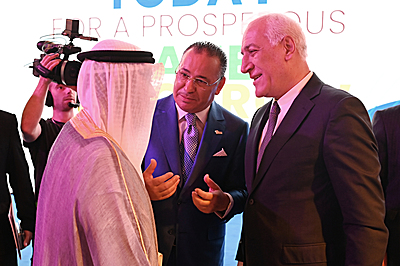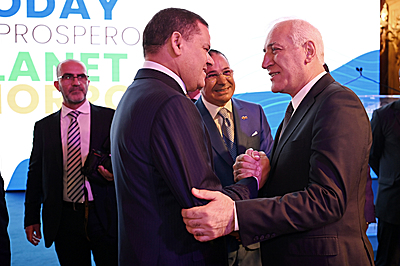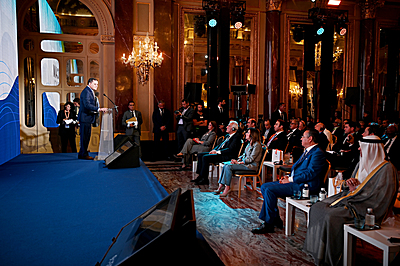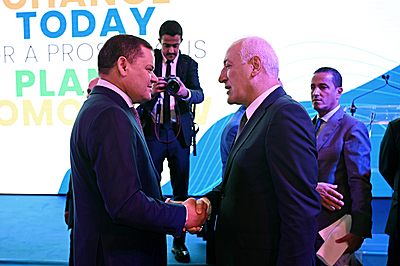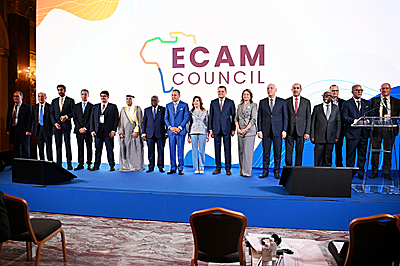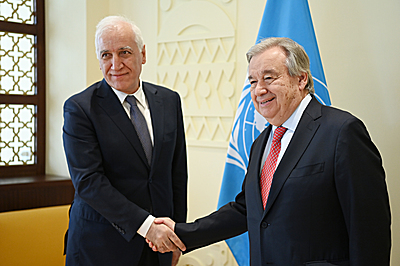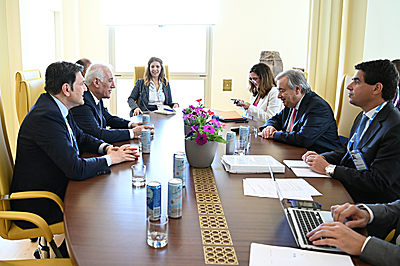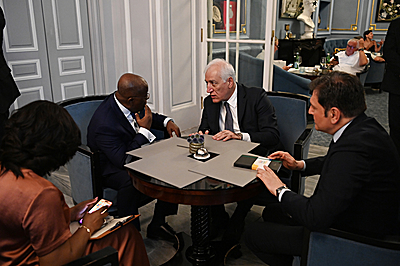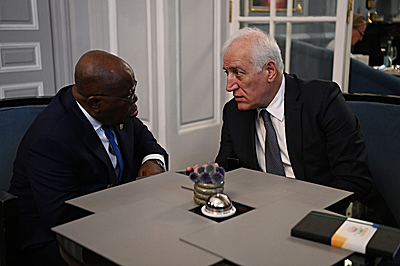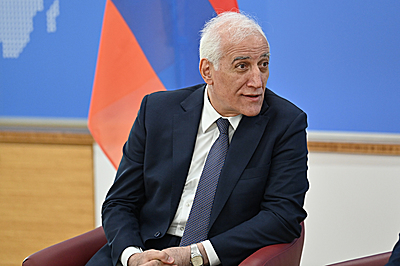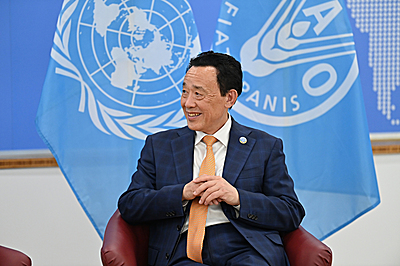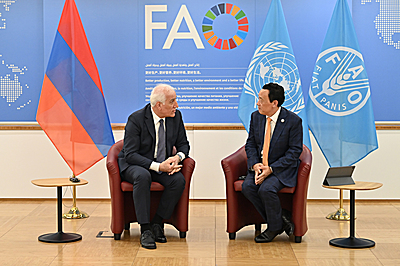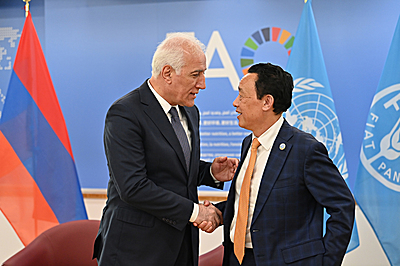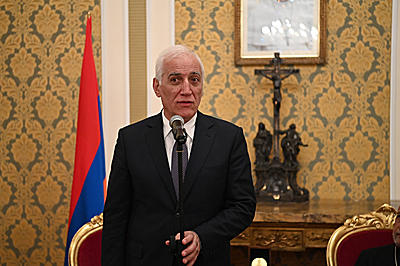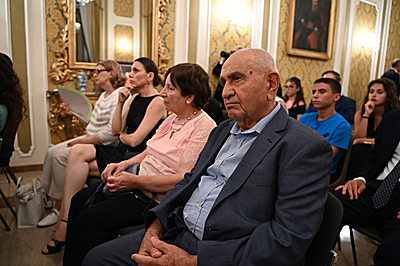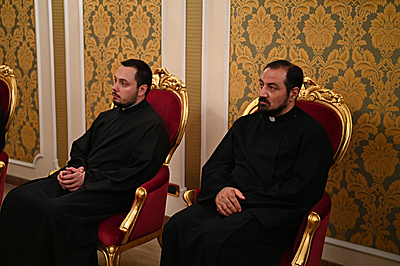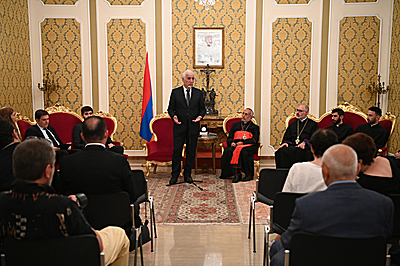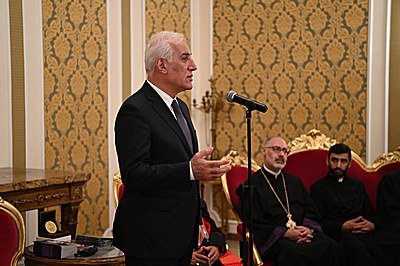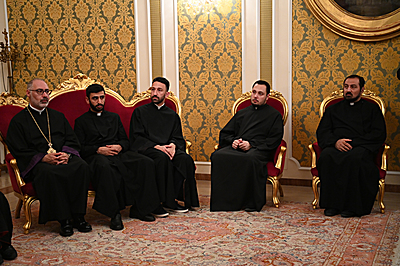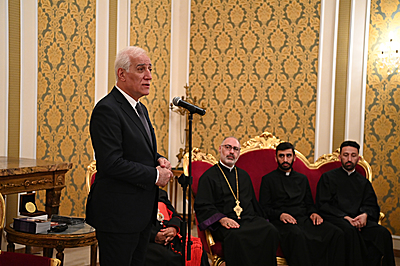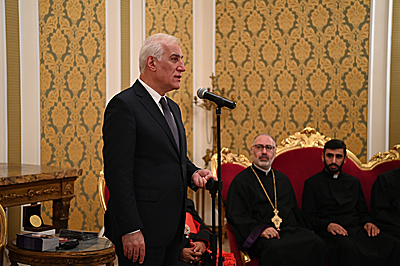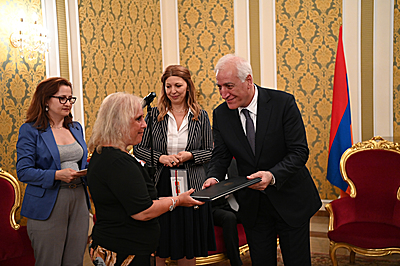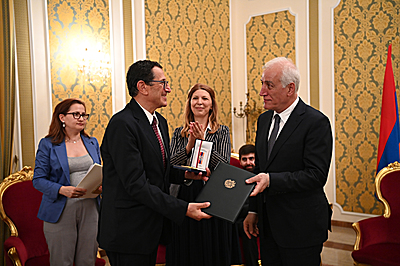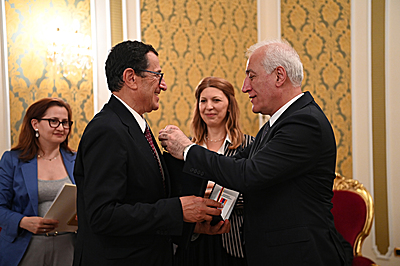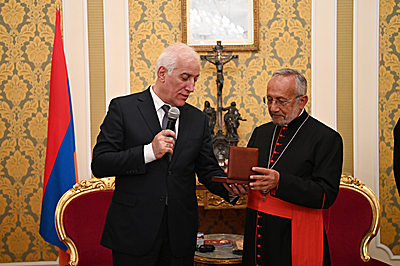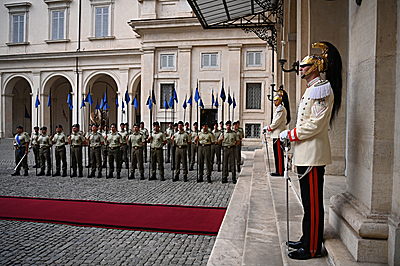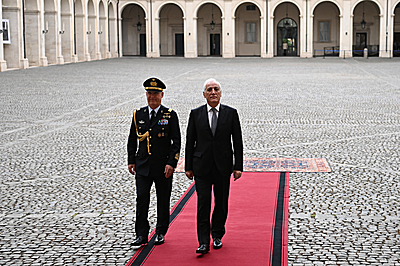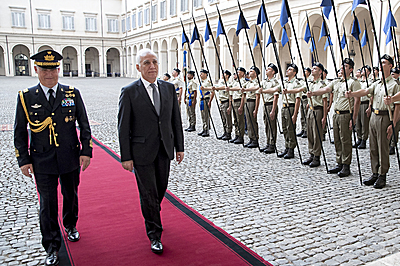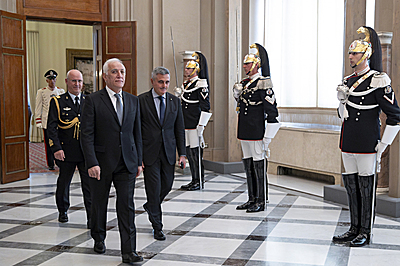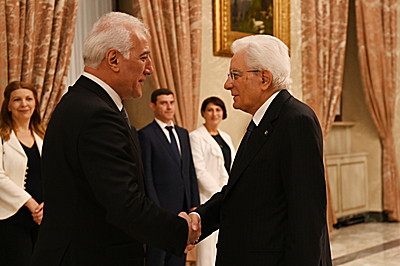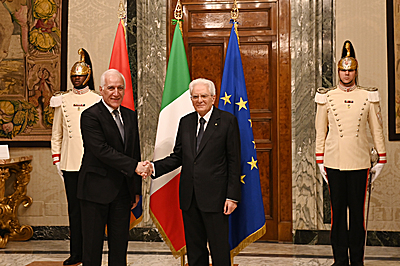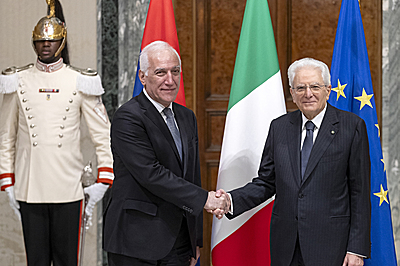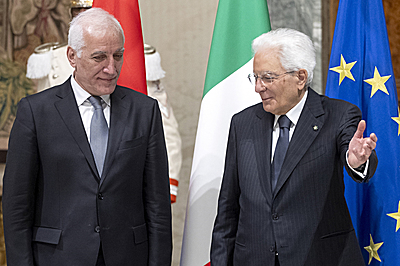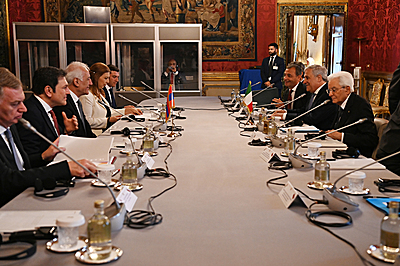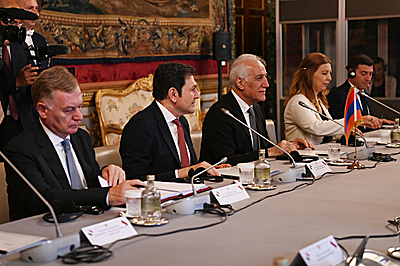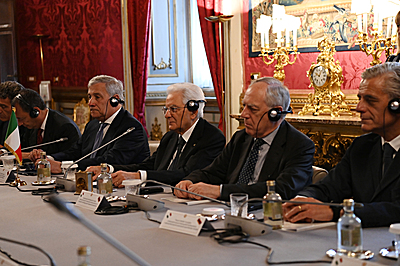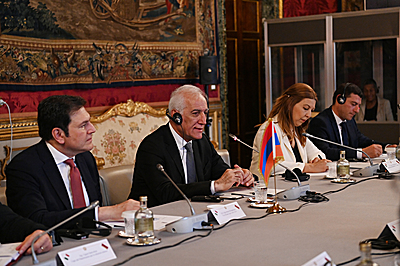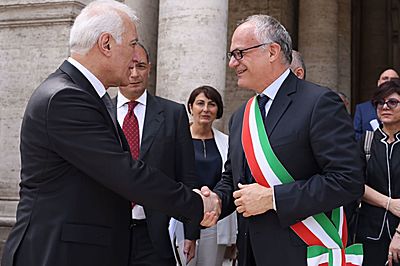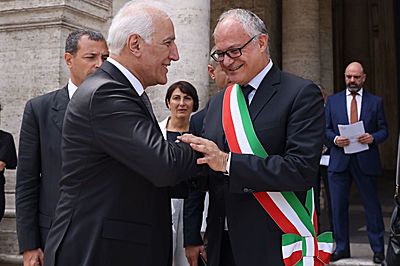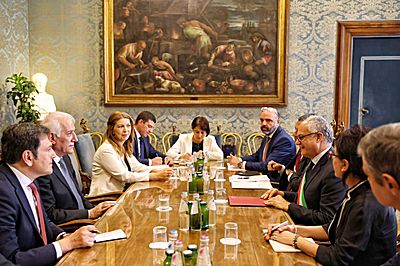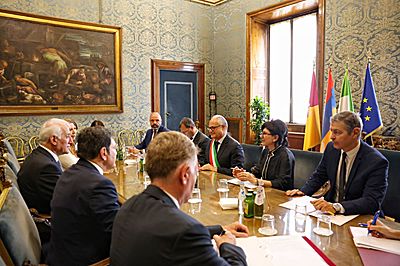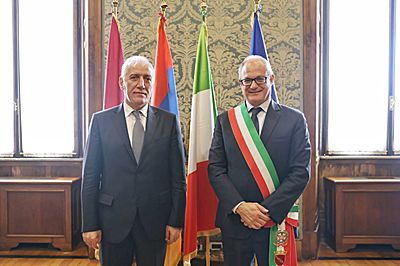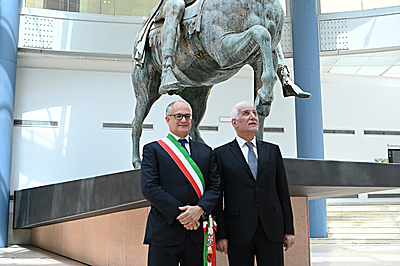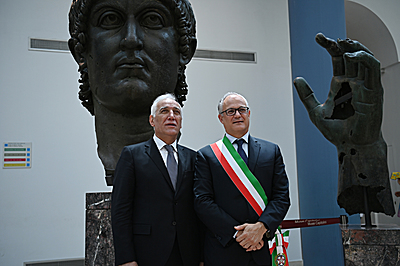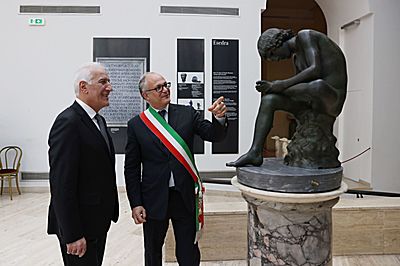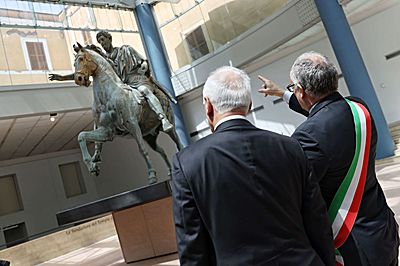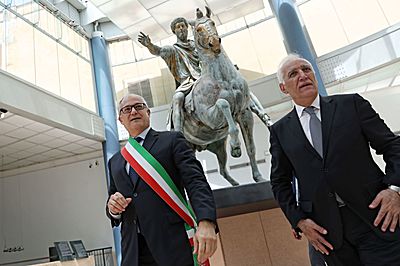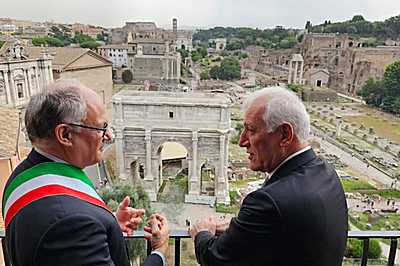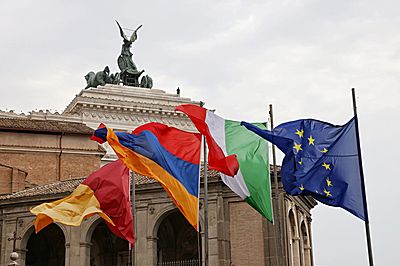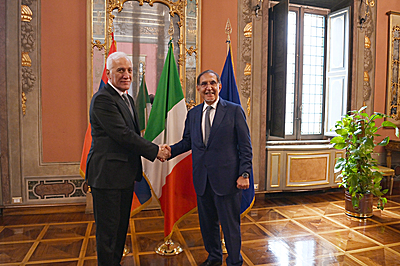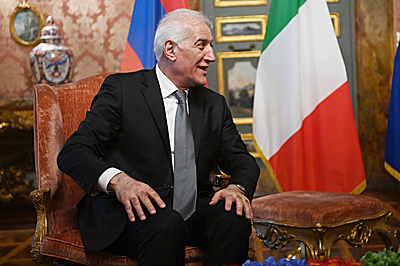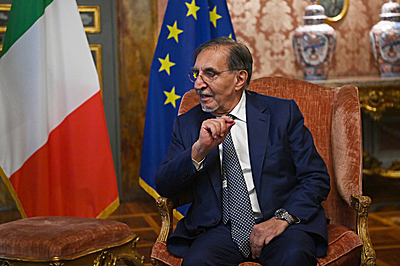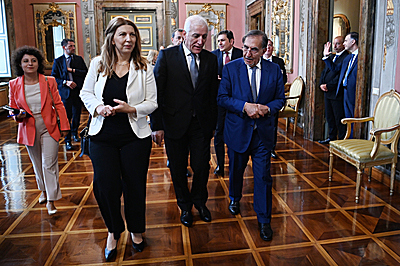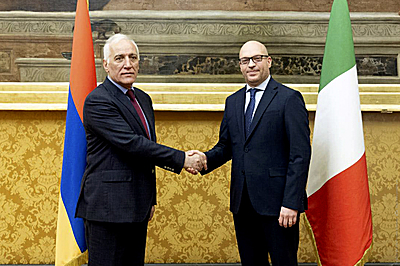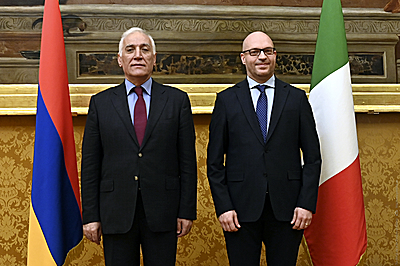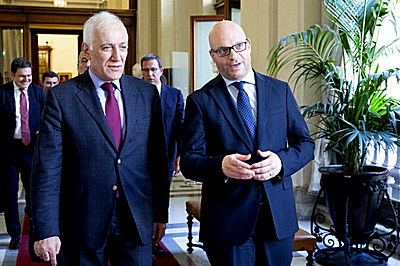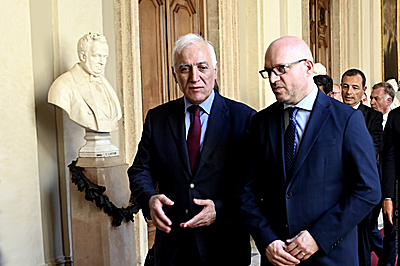Foreign visits
Working visit of the President Vahagn Khachaturyan to the Italian Republic
President of the Republic of Armenia Vahagn Khachaturyan arrived in the Republic of Italy on a working visit on July 23.
The Armenian delegation led by President Vahagn Khachaturyan visited Saint Lazarus Island, met with the Fathers of the Mkhitarist Congregation and familiarized himself with the center's valuable cultural heritage and current activities. The President talked with the fathers of the Congregation and representatives of the Armenian community in a frank atmosphere and answered their questions. President Khachaturyan emphasized that he is ready to support and contribute to the popularization and development of the religious and cultural center.
The President highlighted that it has become a tradition for the top leadership of the Republic of Armenia to visit Venice during their visits to Italy which is the best opportunity to once again value in Venice the priceless spiritual and cultural heritage of the Armenian people, and in particular, the Mkhitarist Fathers that belongs not only to Armenians and Italians, but also has a global value. Vahagn Khachaturyan emphasized that due to this historical and cultural heritage, the Armenian-Italian friendship crystallized and the effective and multi-level cooperation between the two states experienced significant development.
President Vahagn Khachaturyan also visited the Honorary Consulate of the Republic of Armenia in Venice. RA Honorary Consul Gagik Sarukhanyan, welcomed the President Vahagn Khachaturyan and noted that it is a great honor for him to host the President at the RA Honorary Consulate in Venice. During the meeting, Consul Gagik Sarukhanyan presented to the President the issues on the Consulate's agenda and future plans.
During his working visit to the Republic of Italy on July 23-26, President Vahagn Khachaturyan will have meetings with the President of Italy Sergio Mattarella and representatives of Italy's top leadership. Vahagn Khachaturyan is scheduled to participate in the event of the Ambrosett think tank and the European Corporate Council for Africa and the Middle East (ECAM Council) entitled "Global Leaders today: multilateralism for a better future."
***
As part of his working visit to the Republic of Italy, the President of the Republic of Armenia Vahagn Khachaturyan attended the summit of the European Corporate Council of Africa and the Middle East (ECAM Council).
ECAM's annual multilateral summit aims to bring together the leaders from various political and professional fields for constructive analysis, exchange of ideas and pathways to address various challenges. The summit was organized in collaboration with the Ambrosetti think tank in Italy as part of the UN Food and Agriculture Organization event.
Armenian President Vahagn Khachaturyan delivered a speech within the framework of the summit.
“At the outset, let me express my gratitude to the European House – Ambrosetti, one of the most respected Think Tanks - for organizing today’s important and timely event, as well as for its mission in general - to promote constructive dialogue, new partnerships and strong cooperation between different regions.
Since its inception, the Forum has brought together Heads of State, Governments, cabinet members, Nobel laureates and business-people to discuss solutions to the most pressing challenges for the world’s sustainable development. And today, as President of Armenia, I am particularly pleased to be offered from this very podium to address the distinguished audience at this increasingly challenging for my country time.
As we gather here in Rome, I would like to briefly reflect upon the deep-rooted relations between Armenia and Italy. Our two nations have shared historical, cultural, and economic ties that have withstood the test of time. Italy has been a valuable partner to Armenia, and we cherish the bonds of friendship that exist between our countries.
Ladies and Gentlemen,
The title of today’s important event “Driving Change Today for a Prosperous Planet Tomorrow” and its very goal resonates with Armenia deeply. As you are aware, the Armenian nation currently continues to struggle for a just peace in our region, and the leadership of the country is genuinely committed to advancing this noble objective. Such a commitment is an ambitious yet necessary goal in these turbulent times for our region and the world.
While referring to food security sustainability, I would like to highlight that it is one of the most important security components of any society. It plays a decisive role in improving security and living standards of the population.
In the meantime, we must view today’s agenda in a wider context of the recent developments taking place in the world. My country is extremely sensitive to food security issues especially today when the Armenian population of Nagorno Karabakh is challenged with food shortages and hardships in their homeland. The humanitarian crisis in Nagorno Karabakh is deteriorating on daily basis. For almost 8 months the population is deprived of all kinds of goods supplies, resulting from the illegal blockade of the Lachin corridor by Azerbaijan. There is a real threat of ethnic cleansing of Armenians in Nagorno-Karabakh by Azerbaijan, and there is an urgent need to address the issues of fundamental rights and security of the 120,000 Armenian population of Nagorno Karabakh. Azerbaijan cut all means of food, medicine, electricity and gas supply to Nagorno-Karabakh. Despite numerous calls of international community and legally binding decisions of international organizations, including International Court of Justice, Azerbaijan continues to blockade Nagorno Karabakh, enjoying complete impunity.
Mr. Chairman,
Let me provide some data in order to vividly illustrate how the situation developed during the recent months:
• On February 22, the International Court of Justice issued a legally binding order against Azerbaijan to take all necessary measures to ensure unimpeded movement of persons, vehicles and cargo along the Lachin corridor in both directions.
• In stark contrast to this order, on April 23, Azerbaijan illegally installed a checkpoint on the Lachin corridor, claiming that hereby it implements the Order of the Court.
• On June 15, Azerbaijan went further with fully blocking the corridor by banning any access to Nagorno-Karabakh, even humanitarian, including of the International Committee of Red Cross.
• On July 6, the ICJ issued another order reconfirming its previous ruling and reaffirming Azerbaijan’s international legal obligation to take all necessary measures at its disposal to ensure unimpeded movement of persons, vehicles and cargo along the Lachin corridor in both directions and, therefore to immediately cease the operation of its checkpoint, as it unquestionably impedes the rights of Armenians living in Nagorno-Karabakh constituting a discrimination under the Convention on the Elimination of All Forms of Racial Discrimination.
Mr. Chairman,
From the humanitarian perspective, the most pressing are the energy and food security issues, as well as the disruption of the proper functioning of the healthcare system. I would like to present to you some facts and figures that will help to have a better understanding of the situation on the ground.
• Since January 9, 2023, Azerbaijan has disrupted the supply of electricity through the sole high-voltage line between Armenia and Nagorno Karabakh. There have been daily six-hour power outages, almost 50% decrease in electricity consumption, and depletion of local electricity production and supply systems.
• Starting from December 13, 2022, Azerbaijan periodically, and since March 21, almost continuously, has been interrupting the only gas supply from Armenia to Nagorno Karabakh, thereby deepening the energy and humanitarian crisis.
• Due to the diminishing availability of fuel and other essential resources and the full interruption of supplies from Armenia, almost all agricultural work, as well as the functioning of other sectors of the economy, has halted.
• Furthermore, the transport system is also paralyzed, with public transportation, including the inter-community one, to stop functioning in the coming days, while private transportation has come to a standstill long ago. Due to the acute lack of fuel, the internal public transportation of the capital city of Stepanakert functions only with 2 buses serving over 60,000 people.
In relation to today’s very subject of discussion - food security, let me underline, that:
• The suspension of all humanitarian supplies since June 15, coupled with the gradual utilization of limited domestic stocks, has resulted in an acute food shortage and closures of shops. Prior to the blockade, around 90% of all consumed food was imported from Armenia, and with every passing day the people of Nagorno-Karabakh don’t receive 400 tons of essential goods.
• Furthermore, by using force and the threat of force, Azerbaijan continues to obstruct agricultural activities on approximately 10,000 hectares of land adjacent to the contact line, which constitutes a significant portion of the total cultivated land.
• As a result, today the people of Nagorno-Karabakh are on the verge of hunger and starvation.
The illegal blockade resulted in violation of other fundamental rights of the people of Nagorno-Karabakh, including:
• The right to healthcare, as due to the lack of fuel, the work of the healthcare system is also affected, being often unable to organize even emergency transportation of patients to local hospitals. Daily power outages and fuel shortages have severely impacted the operation of medical equipment, leading to a decrease in the volume and quality of healthcare services.
• The growing shortage of medications and medical supplies, coupled with the ban on transporting medical patients to Armenia, poses an increasing threat to people's lives and well-being;
• Due to the lack of essential food and vitamins, approximately 2,000 pregnant women, around 30,000 children, 20,000 older persons and 9,000 persons with disabilities are struggling to survive under conditions of malnutrition.
• People with chronic diseases, including 4,687 individuals with diabetes and 8,450 individuals with circulatory diseases, are left almost without any medicine needed.
• The shelves of pharmacies are completely empty, unable to provide even first aid medicine.
Mr. Chairman,
In light of this humanitarian catastrophe, we cannot remain silent and indifferent, but should act decisively and without delay to prevent the looming tragedy. All nations should reject seizure of resources needed for life and sustainability. This is a shared threat that the global community must discuss and meet head-on.
Outside our region things do not look better, which means that road to peace and goodwill is still long. People should be able to live and create in a rapidly evolving and shrinking world, in which wars and aggressions have no place.
Ladies and Gentlemen,
Armenia has a unique geostrategic importance, naturally serving as a bridge between the two continents. The opening of regional communications is one of the priorities of our Government’s agenda, and necessary steps are being undertaken in this direction. I would like to present Armenia’s vision regarding the infrastructure projects aimed at regional connectivity in South Caucasus. Armenia has always embraced this concept recognizing the immense potential it holds for fostering economic growth, promoting cultural exchange and peace. Our vision encompasses an Armenian crossroad that transcends political complexities, promoting cooperation and partnership among nations.
However, Azerbaijan's belligerent rhetoric and actions, along with the unjustified demands for an extraterritorial corridor through the territory of Armenia, pose obstacles to the implementation of these and other crucial projects. We firmly believe that open and reliable communication channels are vital for securing understanding, trust and cooperation between nations and we firmly uphold the belief in constructive dialogue and peaceful negotiations as the means to address conflicts and foster regional progress.
Furthermore, I would like to reflect on the steps that Armenia has taken in the direction of food security, smart agriculture, and intensive gardens. We are committed to ensuring that our country not only meets its domestic food requirements but also becomes a reliable supplier of high-quality agricultural products. Through innovation, technology, and sustainable farming practices, we are bolstering our agricultural sector, which plays a pivotal role in our economic development and international image.
Pleased to inform that last month the Armenian Government approved a strategy and an action plan aimed at improving our country’s food security system in 2023-2026.
Ladies and Gentlemen,
Armenia’s democracy is the biggest achievement we have, and we are determined to defend it, along with independence, sovereignty and territorial integrity of my country by all means.
We are keen to build peace in our region, while having support of international community, which will stand by the sovereign and democratic Armenia.
We remain committed to pursuing regional connectivity, sustainable energy development, food security, and economic growth.
And finally, we seek partnerships and support from the international community to realize our vision and contribute to a prosperous and peaceful world.
In conclusion, I once again express my gratitude to the European House - Ambrosetti for providing this platform.
***
As part of his working visit to Italy, President Vahagn Khachaturyan had a meeting with UN Secretary General Antonio Guterres within the framework of the UN Food Systems Summit.
During the meeting, the worsening humanitarian situation in Nagorno-Karabakh was discussed.
The sides touched upon the realities and developments in the South Caucasus region.
During the discussion, ideas were exchanged regarding the issues on the agenda of sustained cooperation between the United Nations and the Republic of Armenia.
***
As part of his working visit to Italy, President Vahagn Khachaturyan met with the President of Ghana Nana Akufo-Addo within the framework of the event entitled "Global Leaders today: multilateralism for a better future" held in Rome.
During the meeting, the sides discussed a number of issues related to the development of relations between the two countries. Ideas were exchanged on the issues on the agenda of mutual interest.
***
President of the Republic of Armenia Vahagn Khachaturyan, as part of his working visit to Italy, had a meeting with the Director-General of the Food and Agriculture Organization of the United Nations Qu Dongyu within the framework of the UN Food Systems Summit.
Qu Dongyu, welcoming President Khachaturyan, noted that he is very glad for the opportunity to meet the President of Armenia and discuss issues aimed at effective cooperation.
President Vahagn Khachaturyan, welcoming the Director-General of the Food and Agriculture Organization of the United Nations, attached great importance to cooperation between Armenia and the United Nations, in particular, the Food and Agriculture Organization. In his speech, the President of the Republic of Armenia stated: "I am happy for the opportunity to meet you and have a frank discussion on topics of mutual interest. In recent years, significant reforms have been carried out in the economy of Armenia that are mainly the result of the policies of the present Government and the implemented democratic reforms. Due to that, our economy has become more attractive for investments, and we will continue to follow that path. The Government of Armenia recently approved the food security strategy by which we are guided. Armenia pays special attention to the introduction and application of digital and high-tech innovations in the field of agriculture. From this perspective, we also hope to carry out big strategic projects with you."
Qu Dongyu noted in his speech that he is greatly interested in Armenia, the economic model of Armenia and will willingly make efforts to create platforms for the promotion of Armenian products. The Director-General emphasized that he attaches great importance to the presence of an attractive investment environment as well as the use of high technologies. Qu Dongyu underscored that the Food and Agriculture Organization of the United Nations creates conditions and a suitable environment for investment and economic development and thereby provides its support.
Toward the end of the meeting, both sides emphasized the importance of making efforts to further expand the scope of cooperation.
***
As part of his working visit to Italy, the President of the Republic of Armenia Vahagn Khachaturyan attended the panel discussion within the framework of the UN Food Systems Summit.
The President specifically stated, "We live in the 21st century, however, the issues remain the same. Today we are facing a most serious problem. Each of us has our share of responsibility. It does not matter whether the country is powerful or not, whether it is one person or a nation. Now we bear the responsibility for this situation and we are trying to find solutions, and these solutions are also voiced in the speeches made here.
We all have our own solutions to problems. There is more water in one country than in another, more mountains than in another. Each of us has pictures of the solution to problems in our own way. Armenia is one of the countries that have more mountains than arable lands, but this does not mean that there is a food problem in our country. On the contrary, our history shows that we have tried to resolve the issues related to food security for thousands of years and we have succeeded in it.
Our main agricultural development programs are aimed at business participation, in other words, we have created an economic and financial system where business and the agricultural sector have certain tax privileges, and most importantly, they are aimed at ensuring modern high-tech agriculture. We have such investments in animal husbandry and we are still discussing with experts which branch of agriculture we should develop."
In his speech, President Khachaturyan also touched upon the worsening humanitarian situation in Nagorno-Karabakh and noted that we are dealing with a unique manifestation of threats to food security where the issue is not the shortage of food, but the delivery of food to people who need it. In this context, the President noted that in any conflict or war situation, actions against fundamental human rights and freedoms and high values of humanism are unacceptable.
***
During his working visit to the Republic of Italy, the President of the Republic of Armenia Vahagn Khachaturyan awarded the Medal of Gratitude to the Member of the Italian Senate Pier Ferdinando Casini and journalist, publicist Victor Vital Brantegem for their significant contribution to the strengthening and development of relations between Armenia and Italy.
The President thanked the awardees and wished them success in their future endeavors.
***
As part of his working visit to the Republic of Italy, President of the Republic of Armenia Vahagn Khachaturyan met with the representatives of the Armenian community of Rome at the Pontifical Armenian College.
During the meeting, in a frank atmosphere, President Khachaturyan touched upon the general internal and external situation of Armenia, regional issues and the principles adopted by the Armenian authorities in order to address them.
The President underscored that presently Armenia has a clear position on establishing peace in our region and friendly relations with its neighbors.
The President also addressed the reforms carried out in recent years in various spheres of the country's domestic life, particularly in the economic life. Vahagn Khachaturyan highlighted that the present Government is guided by the principles of making the Armenian economic environment more flexible and attractive for investments and is taking the required steps for this purpose.
Within the framework of the meeting with the representatives of the community, the President awarded a Medal of Gratitude to Letizia Leonardi and Talal Khrais for their services to Armenia and the Armenian people.
***
President of the Republic of Armenia Vahagn Khachaturyan met with President Sergio Mattarella at the residence of the President of the Republic of Italy.
Welcoming his counterpart, the President of Italy noted: "It is a great privilege for me and for the Italian people to host you today. Your visit is a great opportunity to mark the deep-rooted friendship between our peoples and to further strengthen the close relations between our countries."
Expressing his gratitude for the reception, President Vahagn Khachaturyan emphasized that Armenian-Italian relations have a long history. "We have always sensed the Italian spirit in Armenia and Yerevan. I am pleased to note that we successfully maintain the high level of our relations on political, economic and cultural platforms. We highly appreciate the close cooperation between Armenia and Italy both on bilateral and European Union platforms," the President noted.
During the meeting, the sides discussed a wide range of issues related to the expansion of existing cooperation in the fields of mutual interest for Armenia and Italy and the possibilities of implementing new joint projects. The sides also touched upon the prospects of promoting effective contacts in the commercial, economic, construction, and high-tech sectors. President Mattarella noted that recently he has noticed the growing interest of Italian businessmen in Armenia.
Referring to the growth of interest of foreign businesses in the Armenian economy, President Vahagn Khachaturyan highlighted that this is mainly due to the reforms made in Armenia in recent years both in socio-political and economic life. The President noted that due to the reforms and legislative changes carried out by the Government, the Armenian economy has become more attractive for investments.
"We are following the path of democracy also in the field of economy, we have no other resources and since independence, democracy has been one of our most important achievements, and it is the processes of democratization, the fight against systemic corruption that contributed to making Armenia's investment environment attractive for foreign investors," the President noted.
During the discussion, the President of the Republic of Armenia presented to his counterpart the details of the increasingly worsening humanitarian situation in Nagorno-Karabakh and the general developments in the South Caucasus region. President Khachaturyan underscored that regardless of the challenges, Armenia is firm in its position to achieve sustainable and durable peace in the region and to establish good relations with its neighbors.
In response, President Mattarella noted that he highly appreciates Armenia's bold steps toward establishing peace and is ready to contribute to the efforts aimed at establishing peace in the South Caucasus region.
During the meeting, ideas were also exchanged regarding the possibilities of sustained promotion of cooperation between Armenia and Italy in the fields of education, science, healthcare, culture and tourism. Both sides attached importance to the existence of direct flights between Armenia and Italy which is a good opportunity for the development of tourism.
***
As part of his working visit to the Republic of Italy, President Vahagn Khachaturyan met with the Mayor of Rome Roberto Gualtieri.
Welcoming the President, the Mayor noted, "It is a great honor for me to receive you in Rome. Armenia is a country that shares an ancient history with Rome, and today it is a great pleasure to have this opportunity to talk with you about the development of our relations. Armenia is a friendly country and your visit can become an impetus for further deepening of our cooperation."
Expressing his gratitude for the reception, President Vahagn Khachaturyan noted, "I am delighted to be in Rome today and meet with you. I have a special attitude towards the local authorities and I understand very well the complexity and responsibility of your work. I am also sure that it is a great honor for Mr. Mayor to be the head of a city such as Rome. You have a great and responsible mission to preserve, protect and pass on the verve and spirit of Rome to generations."
During the meeting, the sides discussed the issues on the agenda of further deepening of Armenian-Italian cultural ties. President Khachaturyan underscored that it is paramount for Yerevan and Armenia to familiarize with the Italian practice and best traditions of preservation and restoration of historical and cultural heritage and archaeological sites in scope of which there are wide opportunities for contacts.
During the discussion, ideas were also exchanged regarding the possibility of holding mutual cultural events and exhibitions in Yerevan and Rome and taking steps in that direction.
***
As part of his working visit to the Republic of Italy, the President of the Republic of Armenia Vahagn Khachaturyan had a meeting with the President of the Senate of Italy Ignazio La Russa.
Welcoming the President of the Republic of Armenia, the President of the Senate noted, "It is a great honor to receive you. The relations between our countries date back to ancient times which is an essential requisite for the development and expansion of our present ties and close cooperation in parliamentary diplomacy and on economic and cultural platforms. I am ready to make efforts to continuously deepen these relations."
President Vahagn Khachaturyan expressed his gratitude for the reception and emphasized the importance of sustained development of Armenian-Italian friendly relations.
During the meeting, the sides discussed the prospects and pathways of promoting cooperation between Armenia and Italy in political, economic, cultural and other fields.
In the course of the discussion, the sides touched upon the general realities and current developments in the South Caucasus region. The President of the Republic of Armenia presented to the President of the Senate the details of the complex humanitarian situation in Nagorno-Karabakh.
In his speech, the President of the Senate Ignazio La Russa highlighted the importance of addressing humanitarian issues which can also serve as basis for seeking diplomatic solutions.
At the meeting, ideas were exchanged on possibilities to strengthen and expand effective cooperation on both bilateral and international platforms.
***
The President of the Republic of Armenia Vahagn Khachaturyan met with the President of the Chamber of Deputies of Italy Lorenzo Fontana within the framework of his working visit to the Republic of Italy.
Welcoming President Khachaturyan, Lorenzo Fontana noted, "Welcome Mr. President. It is a great privilege for us to receive you. Our countries have historical and cultural friendly relations and there is a desire to bring them closer.
I myself come from the Veneto region and I am very well aware of the Armenian-Italian cultural relations. Our cooperation has good traditions at the political level as well and it is no coincidence that the Armenian-Italian parliamentary friendship group was reorganized. We are well aware that Armenia is going through difficult times and we are ready to support the establishment of sustainable peace in your region."
Expressing his gratitude for the reception, President Vahagn Khachaturyan noted, "We highly appreciate the work carried out by the Italian-Armenian parliamentary friendly group. We are currently on a rough path and unfortunately the difficulties are not yet overcome. However, our baseline is that we should live peacefully with our neighbors and this is the position of Armenia. Of course, a lot depends on the neighbors to achieve final peace, and it is precisely on this account that countries like Italy can support the establishment of sustainable and lasting peace in our region."
During the meeting, the sides discussed the prospects and pathways of the sustained development of parliamentary diplomacy between Armenia and Italy. Both sides emphasized the importance of expanding the existing close contacts between the Parliaments of the two countries.
During the discussion, the sides touched upon the overall situation and developments in the South Caucasus region, as well as the complex humanitarian situation in Nagorno-Karabakh.
Ideas were exchanged on the importance of promoting efforts aimed at the rule of democratic reforms and values within the framework of parliamentary diplomacy, and the significance of sharing best practices in the process of establishing democracy.
